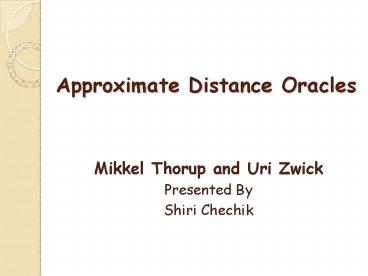Approximate Distance Oracles - PowerPoint PPT Presentation
Title:
Approximate Distance Oracles
Description:
Distance Oracles - Construction Thorup and Zwick (2005) From each cluster, construct a tree T(w) containing shortest path. Distance Oracles ... – PowerPoint PPT presentation
Number of Views:119
Avg rating:3.0/5.0
Title: Approximate Distance Oracles
1
Approximate Distance Oracles
Mikkel Thorup and Uri Zwick Presented By Shiri
Chechik
2
Approximate Distance Oracles
- Consider a graph G(V,E).
- An approximate distance oracle with a stretch k
for the graph G is a data-structure that can
answer an approximate distance query for any two
vertices with a stretch of at most k. - For every u,v in V the data structure returns in
short time an approximate distance d such
that dG(u,v) ? d ? k dG(u,v) .
3
Approximate Distance Oracles
Reference Preproc. time Space Query time Stretch
Awerbuch-Berger-Cowen-Peleg 93 kmn1/k kn11/k kn1/k 64k
Cohen 93 kmn1/k kn11/k kn1/k 2k?
Thorup-Zwick 01 kmn1/k kn11/k k 2k-1
Constant query time!
This tradeoff isessentially optimal !
Slide from Uri Zwick
4
Spanners - Formal Definition
- Consider a graph G(V,E) with positive edge
weights. - A subgraph H is a k-spanner of G if for every u,v
in V dH(u,v) ? kdG(u,v) .
5
Spanners - Example
v
6
Spanners - Equivalent Definition
- A subgraph H is a k-spanner of G if for every
edge (u,v) in E dH(u,v) ? k w(u,v) .
x
y
7
Spanners for General graphs
- Theorem
- One can efficiently find a (2k-1)-spanner with
at most n11/k edges.
8
Spanners for General graphs
- Girth Conjecture (Erdös and others)
- There are n-vertex graphs with O(n11/k) edges
that have girth gt 2k. Known for k1,2,3,5.
9
Spanners - Equivalent Definition
- A subgraph H is a k-spanner of G if for every
edge (u,v) in E
x
y
10
Greedy Algorithm
11
Greedy Algorithm - Properties
- H is a k-spanner of G (trivial).
- The girth of H is greater than k1.
- Assume c is a cycle of size at most k1
- Let e(u,v) be the last edge added to cycle c.
- Let w(e) be the weight of edge e.
- All other edges of cycle c are of weight less
than w(e). - We found a path between u and v of length less
than kw(e). - e was not supposed to be added to H.
12
Greedy Algorithm - Example
13
Lemma
- Let G(V,E) be a graph with girth 2k1.
- This is also conjectured to be the lower bound of
the number of edges in a (2k-1)-spanner (Erdös
65).
14
Theorem
- One can efficiently find a (2k-1)-spanner with
edges.
15
Distance Oracles - Construction Preprocessing
Phase
- First build a hierarchy of centers, A0,, Ak
- A0 ?V, Ak ??
- Ai ?sample(Ai-1, n-1/k)
16
Distance Oracles - Construction Preprocessing
Phase
A0
A1
A2
Ak
17
A hierarchy of centers
A0?V Ak ?? Ai ?sample(Ai-1,n-1/k)
Slide from Uri Zwick
18
Distance Oracles - Construction Preprocessing
Phase
- Notations
- pi(v) is the closest node to v in Ai
- For each w ? Ai\Ai1
- C(w) ? v d(v,w) lt d(v,pi1(v))
19
Clusters
w
Slide from Uri Zwick
20
Bunches (inverse clusters)
Slide from Uri Zwick
21
Distance Oracles - Example
V
P1(V)
22
Distance Oracles - Example
- A0 v1, v2, v3, v4
- A1 v2, v3
- A2 v3
- A3
- C(v1) v1, v4, C(v4) v4
- C(v2) v2, v1
- C(v3) v1, v2, v3, v4
V3
1
2
V2
V4
1
1.5
V1
23
Distance Oracles - Construction Preprocessing
Phase
- Data structures
- For every v ? V
- p1(v),,pk-1(v) and the distance from v to pi(v).
- C(v) (hash table) and the distance from v to
every u in C(v).
24
Distance Oracles
- Lemma EB(v)kn1/k
- B(v)?Ai is stochastically dominated by a
geometric random variable with parameter pn-1/k.
Slide from Uri Zwick
25
Distance Oracles
- Lemma
- For every two nodes u and v, there exists a node
w such that - u,v ? C(w)
- The distance from u to w and from v to w is at
most kd(u,v)
26
Distance Oracles - Construction Query Phase
27
Distance Oracles - Construction Query Phase
P3(v)
P2(u)
lt3?
P1(v)
2?gt
lt?
v
?
u
28
Distance Oracles - Example
- What is d(v4, v1)?
- Is v1? C(v4)?
- w p1 (v1) v2
- Is v4? C(v2)?
- w p2(v4) v3
- Is v1? C(v3)? Yes
- C(v1) v1, v4, C(v4) v4
- C(v2) v2, v1
- C(v3) v1, v2, v3, v4
V3
1
2
V2
V4
1
1.5
V1
29
Distance Oracles - Properties Thorup and Zwick
(2005)
- Consider a node v ? C(w), every node on a
shortest path from v to w also belongs to C(w).
x ? Ai1
v
w
y
30
Distance Oracles - Properties Thorup and Zwick
(2005)
- v belongs to C(pi(v)) for every
- 0 i k-1.
31
Distance Oracles - Construction Thorup and Zwick
(2005)
- Short Summary
- For every two nodes u and v, there exists a node
w such that - u,v ? C(w)
- The distance from u to w and from v to w is at
most k?
32
Distance Oracles
- From each cluster, construct a tree T(w)
containing shortest path.
v
u
w
33
Distance Oracles
- The union of all these trees is a (2k-1)-spanner
with - O(kn11/k) edges.































